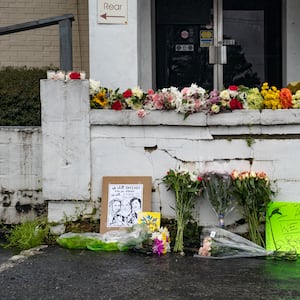When Georgia law enforcement briefed the public on Wednesday morning about the 21-year-old white man who shot and killed eight people—six of them Asian women—at Atlanta-area massage parlors Tuesday night, it wasn’t helpful.
Officials made a puzzling series of claims of fact, despite being cartoonishly cautious about other aspects of the case. Officials claimed that 21-year-old Robert Aaron Long had a “sex addiction” but admitted they didn’t know whether sex work occurred at the places where Long killed people. Who told them that Long had a sex addiction? Was it Long himself?
They weren’t sure whether Long was motivated by the racial identity or gender of his victims, and thus said they couldn’t say with certainty that a hate crime had been committed, but then again, they said with certainty that before he’d committed the crimes the shooter had “a really bad day.” Who told them that Long had a really bad day? Did they fact-check that one, or did they once again simply repeat the words of a suspected mass killer into a microphone? (I think I speak for a lot of people when I say: I don’t give a flying-saucer fuck about what kind of day a mass shooter was having before opening fire.)
In her book Down Girl, philosopher Kate Mann describes the phenomenon of “himpathy,” which she defines as “the inappropriate and disproportionate sympathy powerful men often enjoy in cases of sexual assault, intimate-partner violence, homicide, and other misogynistic behavior.” The phenomenon is particularly on display when a male public figure is accused of sexual misconduct and his defenders comment on how the man’s life has been “ruined,” like when Lindsey Graham lost his marbles during the Brett Kavanaugh confirmation hearings.
When men specifically target women in their violent crimes, some in positions of power fall all over themselves to make the case that those crimes were somehow in women’s power to stop, that men’s out-of-control unmet entitlement functions like a semitruck that lost the use of its brakes while heading down a steep grade, and that those who get hit should have moved out of the way.
Violent acts committed by men who have a problem with women and sex—they’re not getting enough; they feel bad about getting too much; the women who they believe should be giving them sex are instead choosing to have sex with other men—are similarly excused as something we should understand on an emotional level. If only women had been sluttier/less slutty when it came to the sad men, perhaps the men wouldn’t have been pushed to do what they did. In one of the most egregious and infamously stupid versions of this argument, The New York Times’ Ross Douthat suggested that men who say they’re driven to violence due to a lack of sexual attention must be accommodated, because those men cannot be fixed. Since 2014, at least eight acts of mass violence have been committed by men who identify as “incels,” a label that implies that the violence could have been prevented not by the men themselves but by the women who didn’t have sex with them.
The murder of six Asian women and a white man and white woman in Atlanta didn’t only call to mind over-empathization with maleness; Long’s treatment by law enforcement also draws attention to the way authorities treat whiteness.
This tendency for authority figures to trip over themselves to manufacture sympathy and even excuses for offenders in a socially dominant demographic while simultaneously dehumanizing or erasing their victims isn’t reserved for this tragedy. We are repeatedly asked to play a mental Twister game where we see the crime through the eyes of the white madman responsible rather than reserving our empathy for the victims—often people of color or women or both—who suffer as a result. We are prompted to imagine how we would feel if we were picked on, bullied, sad, or undersexed like the perpetrator, to the point that we, like the perpetrator, would resort to violence against people who are in the wrong place, and the wrong body, at the wrong time. To hell with the lives and hopes of the human beings the man steals in his exothermic rage. The men who do these things are treated as the protagonists of their own crimes.
Sometimes, the humanization push is overt, like when a police officer justifies killing a Black person by claiming they were scared, and the justice system determines that this is enough. Stand Your Ground laws exist to extend this right to other people who are afraid for any old reason, whether that reason is based on reality or simply prejudice or perception, even if the person killed was unarmed, or was a child, or was running away. In these cases, feelings matter more than facts. One person’s irrational emotions matter more than another person’s rational desire not to be killed.
Long’s treatment by law enforcement evokes another upsetting truth: Even in the process of arrest, white men who commit high-profile acts of violence seem to be treated more sympathetically by law enforcement. After Dylann Roof killed nine Black worshippers in a Charleston, South Carolina, church, he was arrested after a 16-hour manhunt without injury. Later, the police brought him Burger King in jail and described Roof as “quiet” and “calm.” Patrick Crusius, who killed 23 people in an El Paso Wal Mart in 2019, surrendered himself to authorities and was arrested without incident.
In 2015, a North Carolina man named Robert Lewis Dear ambushed a Colorado Springs, Colorado, Planned Parenthood and shot nine people, killing three. He was also arrested alive, without incident, days later. When members of the public pointed out the racial disparity between the way that police handle white suspects and suspects of color, the Colorado Fraternal Order of Police called them “morons” and described Dear as “peacefully” surrendering and “choosing to live.”
How is any of this useful? How does knowing that Dylann Roof was polite in jail, or that Eliot Rodger couldn’t get laid and felt bad about it, help us work to fix the problem at the root of the violence, which is that white men are seen and too often see themselves as more human than any other group of people?
Understanding the motivations, patterns, and thoughts of violent racists and misogynists is useful to people whose job it is to prevent these crimes from recurring, but the rest of us don’t need to meditate on the humanity of offenders. Instead, we need to know more about the lives of the victims, who are more deserving of humanity and who never deserved to be at the barrel end of a racist’s “bad day.”




